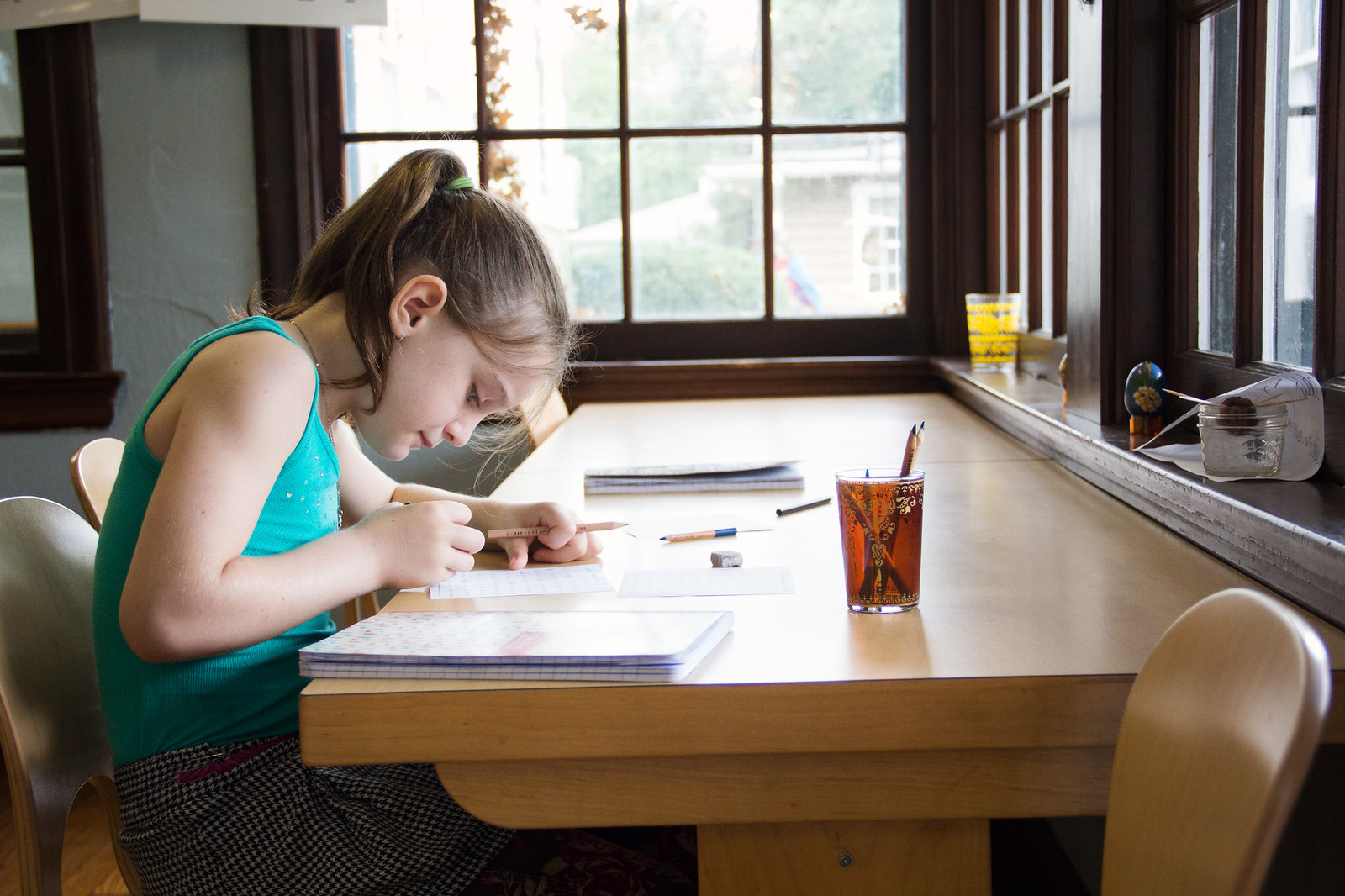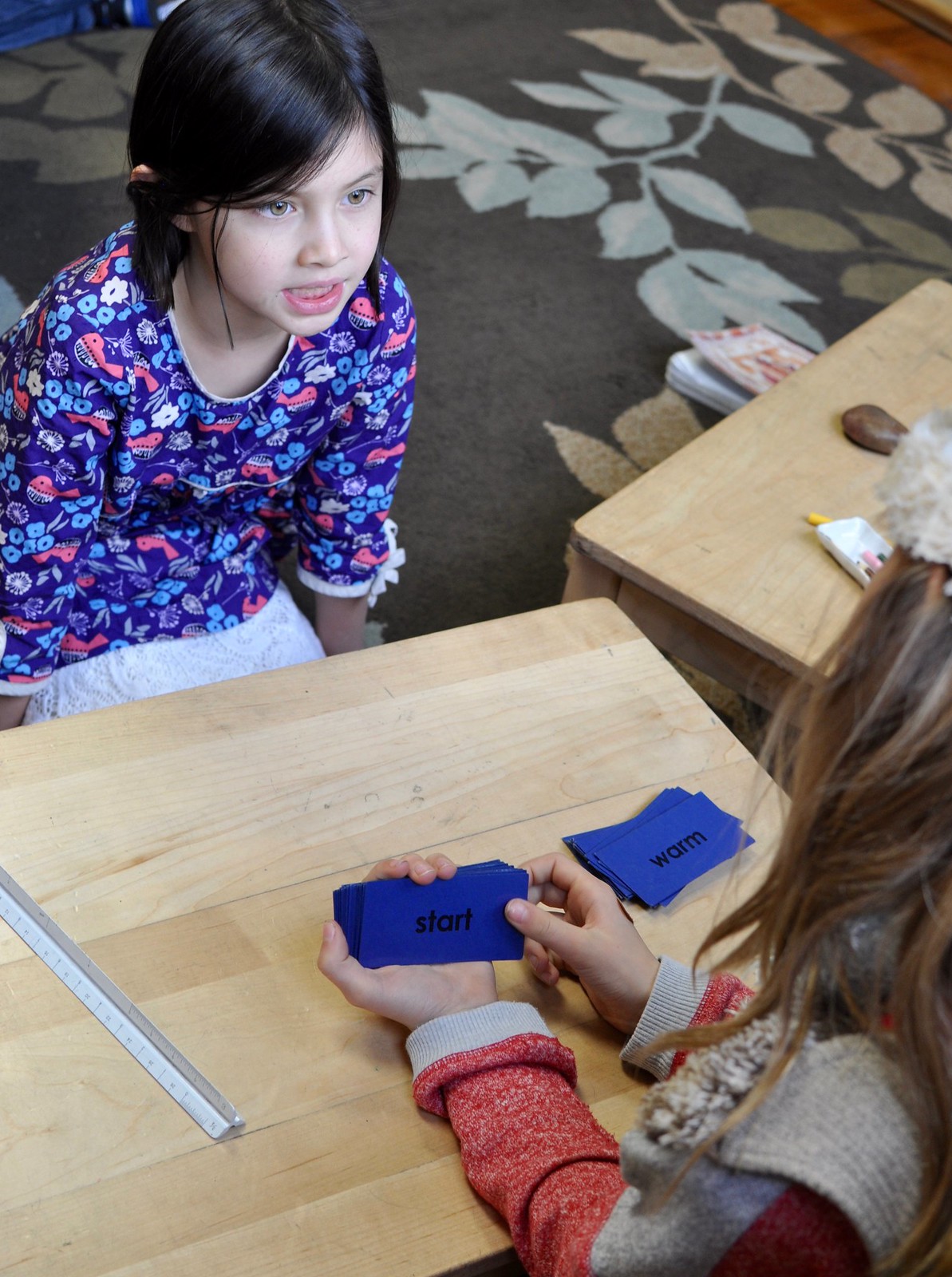On Spelling
 I have a confession. While driving home from school recently, it dawned on me that our youngest, who is five years old, probably didn't know The Alphabet Song. Though we read to him every night, and he looks at book after book after book just before falling asleep, we don't sit around singing the ABC's in our house. Sure enough, when one of his older brothers started singing it, the youngest chimed in, getting most of it, but definitely not all of it. We worked on it, and it didn't take long for him to grasp the song, but it made me think about how different the approach of learning to spell is, and learning about letters and words in general, in Montessori versus a traditional educational setting.In Montessori, children begin the process of writing before reading. Logically, if a child is not yet reading, but attempting to write, he will not spell words correctly. This is not because Montessori doesn't care about spelling; rather, Montessori seeks to inspire joyful expression in the task. In other words, the expression of the idea and the flow of creativity is more important than the limiting, halting prospect of getting every word right. That will come later, when a child reads and re-reads words over and over again.This is not to say that children are thrown into the gauntlet without any guidance. During their years in primary, children are exposed to the idea that letters make sounds. The sound of "d" is "duh," not "dee," the sound of "b" is "buh," not "bee," and so on. All of the lessons leading up to spelling - the sandpaper letters, the moveable alphabet, and later, phonograms and site words - help a child develop her concept of words. When a child starts story writing, she has not yet mastered reading!Robyn Milos, former Children's House Directress and current Director of Education here at Villa di Maria, adds, "In the Children's house, when children have enter the wonderful word of writing, they are introduced to an in-depth study of phonograms to learn the many ways of making one sound (think, ee, ea, y, e-e all make "ee"). With this study they become aware that there are options in spelling and become conscious of how to spell words when writing. I often hear things like 'which ee is in eating?' as they continue to refine writing along with reading in their culminating year."
I have a confession. While driving home from school recently, it dawned on me that our youngest, who is five years old, probably didn't know The Alphabet Song. Though we read to him every night, and he looks at book after book after book just before falling asleep, we don't sit around singing the ABC's in our house. Sure enough, when one of his older brothers started singing it, the youngest chimed in, getting most of it, but definitely not all of it. We worked on it, and it didn't take long for him to grasp the song, but it made me think about how different the approach of learning to spell is, and learning about letters and words in general, in Montessori versus a traditional educational setting.In Montessori, children begin the process of writing before reading. Logically, if a child is not yet reading, but attempting to write, he will not spell words correctly. This is not because Montessori doesn't care about spelling; rather, Montessori seeks to inspire joyful expression in the task. In other words, the expression of the idea and the flow of creativity is more important than the limiting, halting prospect of getting every word right. That will come later, when a child reads and re-reads words over and over again.This is not to say that children are thrown into the gauntlet without any guidance. During their years in primary, children are exposed to the idea that letters make sounds. The sound of "d" is "duh," not "dee," the sound of "b" is "buh," not "bee," and so on. All of the lessons leading up to spelling - the sandpaper letters, the moveable alphabet, and later, phonograms and site words - help a child develop her concept of words. When a child starts story writing, she has not yet mastered reading!Robyn Milos, former Children's House Directress and current Director of Education here at Villa di Maria, adds, "In the Children's house, when children have enter the wonderful word of writing, they are introduced to an in-depth study of phonograms to learn the many ways of making one sound (think, ee, ea, y, e-e all make "ee"). With this study they become aware that there are options in spelling and become conscious of how to spell words when writing. I often hear things like 'which ee is in eating?' as they continue to refine writing along with reading in their culminating year." Lower Elementary students take turns quizzing each other on spelling wordsWhen a child is reading fluently, she begins to recognize words and how they are spelled, and quickly self-correct. Seeing words over and over again during fluent reading is an amazingly effective way of learning how to spell. As children develop their reading, they will start to seek out the correct spelling (this most consistently happens in lower elementary). Gentle reminders from directresses are also effective in correcting spelling as the child develops his skills of self-expression."There is one thing [the teacher] must never do and that is, to interfere by praising a child's work, or punishing him if it is wrong, or even by correcting his mistakes." - Maria Montessori, The Absorbent Mind*Photo credit for the first photograph: Melinda Smith
Lower Elementary students take turns quizzing each other on spelling wordsWhen a child is reading fluently, she begins to recognize words and how they are spelled, and quickly self-correct. Seeing words over and over again during fluent reading is an amazingly effective way of learning how to spell. As children develop their reading, they will start to seek out the correct spelling (this most consistently happens in lower elementary). Gentle reminders from directresses are also effective in correcting spelling as the child develops his skills of self-expression."There is one thing [the teacher] must never do and that is, to interfere by praising a child's work, or punishing him if it is wrong, or even by correcting his mistakes." - Maria Montessori, The Absorbent Mind*Photo credit for the first photograph: Melinda Smith

